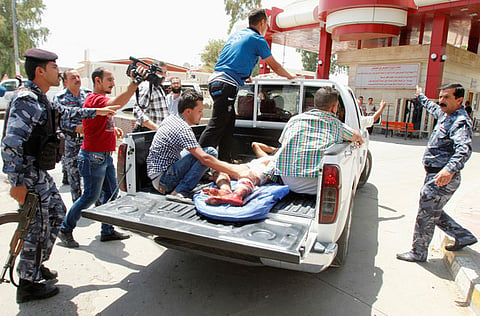Violence surges in Iraq as rows persist
1,500 killed in 3 months, twice previous quarter’s figure

Baghdad: More than 1,500 people were killed in Iraq in the past three months, twice the previous quarter’s figure, data showed on Monday, fanning fears the politically-deadlocked country is slipping back into all-out bloodshed.
The figures come as the country grapples with months of protests by the Sunni Arab minority, tensions along a swathe of disputed territory in north Iraq and a protracted political stand-off that has left key pieces of legislation unresolved.
The violence showed no signs of letting up on Monday as a new attack left eight former anti-Al-Qaida fighters dead.
A total of 452 people were killed by violence in Iraq in June, according to an AFP tally based on reports from security and medical officials, and 1,331 others were wounded, representing a 60 per cent increase from the same month a year ago.
It also brought to 1,527 the number of people killed from April through June, more than double the January-March death toll.
Attacks in June targeted a wide cross-section of Iraqi society — government and security forces were hit by car bombs, mosques were struck by suicide attackers, anti-Al Qaida militiamen were shot dead, and Iraqis watching and playing football were killed by blasts.
The figures were markedly higher than those compiled by government ministries, which pegged last month’s toll at 240 dead and 379 wounded.
Casualty figures compiled by the Iraqi government have typically been lower than those tallied by the United Nations mission in Iraq, AFP and Britain-based NGO Iraq Body Count.
The UN and Iraq Body Count figures for June were not immediately available.
The surge in violence comes amid a protracted political stand-off within Iraq’s national unity government, with little in the way of landmark legislation passed since 2010 parliamentary elections.
And while political leaders have pledged to resolve the dispute, with Prime Minister Nouri Al Maliki meeting his two main rivals last month in a bid to ease tensions, no tangible measures have been agreed.
Meanwhile, tensions along a swathe of territory in north Iraq that Kurdistan wants to incorporate into its autonomous three-province region over Baghdad’s objections have persisted.
And months of protests by the Sunni Arab community, alleging discrimination and targeting at the hands of the Shiite-led authorities, have also continued unabated.
Analysts and diplomats worry that the multi-faceted stand-offs are unlikely to see any long-term resolution before general elections due next year.
At the same time, violence has shown no sign of slowing.
On Monday, eight former Sunni tribal militiamen were kidnapped from their homes north of Baghdad in pre-dawn raids by gunmen wearing military uniforms before being shot dead, assassination-style.
The men were all former fighters in the Sahwa, a collection of Sunni tribal militias that turned against Al Qaida and sided with the US military from late 2006 onwards, helping turn the tide of Iraq’s bloody insurgency.
The Sahwa are regarded as traitors by Sunni militants, and as a result are frequently targeted for attacks.
In the previous week alone, nine Sahwa fighters were killed and 18 others wounded in attacks, according to an AFP tally.
Sign up for the Daily Briefing
Get the latest news and updates straight to your inbox


